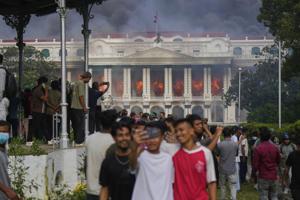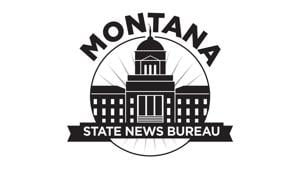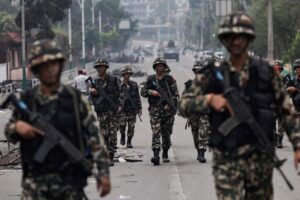
Tensions escalated dramatically in Kathmandu, Nepal, as the Nepalese Army intervened to restore order following intense protests that erupted over government actions. On Wednesday, soldiers patrolled the capital’s streets and enforced a curfew after demonstrators stormed government buildings, set fires, and attacked political figures. This military mobilization is a rare occurrence in Nepal, highlighting the severity of the unrest that has unfolded in recent days.
Protests began earlier this week as young citizens expressed outrage over the government’s decision to block several social media platforms, including Facebook and YouTube. The demonstrations quickly intensified, culminating in violence that left at least 19 dead and many others injured. On Monday, police opened fire on crowds, exacerbating the situation and prompting widespread anger. Videos circulating on social media depicted brutal assaults on political leaders, including a disturbing incident involving Nepali Congress party leader Sher Bahadur Deuba and his wife, Foreign Minister Arzu Rana Deuba.
Government Response and Political Fallout
In the wake of the violence, Prime Minister Khadga Prasad Oli resigned, although this did little to quell the protests, which continued with tens of thousands of participants blocking roads and storming government facilities. In a statement, the military announced that it had arrested 27 suspected looters, emphasizing its commitment to preserving law and order amidst the chaos.
The unrest has drawn attention to deeper issues within Nepal’s political landscape. Many young people have expressed frustration over perceived corruption among political elites, often referred to as “nepo kids,” who enjoy privileges while the majority of youth struggle with high unemployment rates. The World Bank reported that youth unemployment stood at approximately 20% last year, prompting many to seek opportunities abroad, particularly in the Middle East and Southeast Asia.
On Tuesday, President Ram Chandra Poudel appealed for calm, urging protesters to pursue peaceful resolution strategies. He accepted Prime Minister Oli’s resignation and tasked him with heading a caretaker government until a new administration is established. The political uncertainty has left many citizens anxious about the future.
Widespread Damage and Calls for Investigation
The violence resulted in significant property damage across Kathmandu. Smoke still rose from various government buildings, including the parliament and the prime minister’s official residence, which were set ablaze. The offices of Kantipur, the largest media outlet in Nepal, suffered extensive damage, illustrating the chaotic environment that unfolded over the past days.
In response to the violent protests, Prime Minister Oli has ordered an investigation into the police shootings, promising compensation to the victims’ families. The government is also facing scrutiny for its broader attempts to regulate social media through proposed legislation that critics argue could infringe on freedom of expression.
Rights groups have condemned the social media regulations, which require companies to appoint local representatives and comply with government oversight. These measures have been criticized as efforts to silence dissent and limit the voices of those opposing the government. As the situation in Nepal continues to develop, the military’s actions and the government’s response will be closely monitored both domestically and internationally.





